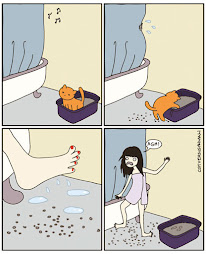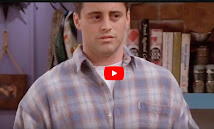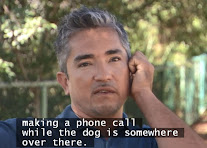My cat, Max, died this morning at about 10:30 a.m. (July 26, 2010). I had him put down.
I'm writing this partly because writing helps me work things out but also because I want this post out there for anyone who ever feels as overwhelmed and anxious as I did about this decision. There's a lot of different opinions on the web about cat care; over the past week, I think I've read and synthesized most of it.
Although this was not the first time I'd seen a pet die, it was the first time that (1) the decision lay on my shoulders; (2) the cat's condition wasn't something I'd encountered before. Max had been failing for several months (rapidly over the course of the last week), but he wasn't actually paralyzed and occasionally looked alert.
What happened first?
First, I got Max in October 1996. I was living with my parents at the time, and I got him on Peaks Island. He was the friendliest of a group of kittens I went to look

at. My older cat, Aurora, demonstrated some maternal instincts when he first showed up after which she promptly decided he was nuts. They more or less got along over the past 14 years.
Max continued to be the friendlier of the two cats although Aurora has livened up as she has gotten older! But Max always had to be where people were, investigating them and their stuff. He also wanted affection on a pretty constant basis: my high-maintenance cat. He was the kind of cat who would beg you for food, eat a couple of bites, and then rush back into the room to climb all over you. There were times when I thought he was going to climb inside my skin, he wanted affection so bad.
The first sign of trouble was this May when Max had
labored breathing. The emergency animal clinic put him on prednisone which seemed to help; however, about the middle of June,
he stopped eating. I switched from dry to wet food and got him to eat a few times a day. He began to get
very weak in his back legs. He was
no longer grooming himself, so I did that; he would still visit the litter box.
This past week, he
stopped eating entirely unless I forced him though he would drink. He also began to search out
hiding places. This, of course, was
a radical personality change from the Max I was used to.
This weekend, he began to
wheeze while laying on his side. He seemed to be in a catatonic state rather than asleep.
He did not cry although picking him up in certain ways obviously hurt him. Animals do not always show when they are in pain (they certainly don't have signs, saying, "Excuse me, I'm in pain"), but I formed the conclusion that he was.
Late Saturday night, I questioned whether I should take him to the emergency clinic to be euthanized even though I had just had his records moved to a regular veterinarian and wanted to take him there. After doing some research on the web, I formed the conclusion that he might die at home (which might be best) and that if he didn't, waiting until Monday to be absolutely sure he wasn't going to improve was the best option.
This morning, Monday, his condition was the same except he was slightly perkier (the weather is cooler). I made the appointment and took him in.
From my perspective, Max was very unhappy. However, based on the stuff I had read on the Internet, he certainly didn't look like a desiccated, hair-matted, eyes-filmed-over, at-death's-door cat. A part of me thought,
Maybe, it is just asthma. We'll be going home with medication in two ticks.
However, I kept reiterating to the staff that I didn't want him to be put through lots of complicated and anxiety-producing tests. I would be doing it for me—and I was perfectly capable of doing it for me: What's VISA for?—not for him.
The extremely experienced vet (
The Cat Doctor in Portland, Maine) was wonderful. She was practical and sympathetic without being maudlin or feeding me any "this is what you should have done" or "this is what GOOD owners do" stuff. It was clear within a few minutes that to her, Max's quality of life was so diminished that keeping him alive would be more for me than for Max. We took him into a room where she did a cursory exam (to make me happy, I think), and she was able to state that his problems were likely lung and/or heart-related and not the types of problems that could be cured or even managed without causing the cat a great deal of distress.
That wasn't what I wanted, so I gave the go ahead for him to be euthanized.
The Internet made it sound like he would be hooked up to some crazy machine, but she actually did it right there, right then. She pulled out a needle, already prepared (over the phone, I had put forward the possibility that Max would need to be put down, and she actually had two needles with her), and inserted it. She told me that there might be a brief struggle as the animal felt himself falling to sleep. But actually, Max didn't struggle at all. He was gone in less than two minutes without a complaint.
By the way, The Cat Doctor has tissue boxes ALL OVER THE CLINIC.
My options were to take the body with me, have a private cremation, or have a group cremation.
My parents offered to bury Max on the island which would have been appropriate, but I really didn't want to carry my dead cat around Portland. The idea of keeping an urn of my animal's ashes is thoroughly creepy. I opted for the group cremation and to have a mold made of Max's paw print.
The whole visit cost $100. I feel this is very reasonable although I realize other people may want cheaper options. Based on my Internet research, some shelters will euthanize for free. However, most vets charge around $50 for euthanasia and $50 for cremation (more, for personal cremation).
So what about my older cat, Aurora?
She's extremely healthy physically (she's two years older than Max, being 16). In terms of her mental? instinctual? state, I'm not sure. She has ignored Max over the last two months. Animals can tell when other animals are dying; Aurora was actually, probably, the best indicator I had for how far gone he was, I just didn't see it.
She loves that I now serve wet food (mixed with dry).
Whether she will miss him or not, I have no idea. When she wanders around the house, it is hard to know if she is looking for Max or hoping I left some food out somewhere.
People say pets grieved, but I'm very wary of believing what people say about their pets: so often, it seems that the wish precedes the evidence. They want to see their own grief reflected in the remaining animal. The animal may actually be reacting more to the owner's emotional/instinct-based aura than to anything else.
In which case, Aurora is just going to have to suffer. Sorry. But I miss Max like crazy; I can't just switch it off.
How about another pet?
It is very tempting to go out TODAY and get a little kitten. But I'm opposed to that course of action for three reasons. The
first is that I wouldn't be replacing Max; I would be trying to soothe my feelings. And the new kitten wouldn't BE Max. (This would be true even if I cloned Max; the new kitten would be itself; I've never understood why people think that two things are the same just because they share the same DNA. This isn't a nature or nurture thing. It's just a reality thing.)
Second, according to Cesar Millan, when an animal comes into a grieving household, it doesn't say, "Oh, I am so sorry for you all. How sad!"
It says, "These creatures are weak. Weak creatures are bad. I must control them!"
Or, rather, it doesn't think at all. It just does it.
I don't want a new kitten running my house. In any case, it deserves more equilibrium.
Finally, I have a more steady paycheck in the fall. New kittens cost!
Still, the new vet is all lined up!
Conclusion
To conclude, if you have an ill/dying/unhappy cat, and you are really worried about what direction to go . . . I can't really tell you except you should trust your observations. One of the websites I read said, "My vet told me I would know when it was time." In retrospect, this is totally correct.
It is
retrospect. However, when I told the vet, "I've been expecting him to be dead every morning over the last few days," she replied that when an owner feels this, it is likely time for the pet to go. I think this is close to what I read: the owner knows better than anyone what quality of life the animal is used to.
If you are worried that the vet will berate you for choosing euthanasia, the good ones won't. They will give you multiple options. If I had walked in there and said, "I want the full work-up! Save his life at all costs!!" they would have done it (as much as they could, at least). But it would have been the wrong decision, and the vet was very clear about where Max stood health-wise.
If you are worried that the process is ultra-expensive, it isn't although you can
make it ultra-expensive! I feel that I gave Max dignity without sacrificing my checkbook to some ridiculous extravaganza that would make me feel . . . well, just as bad actually since it wouldn't bring him back. (If I were more solvent, I would have gone with the private cremation and sprinkled his ashes on Peaks Island; I don't think Mom's tulips would have minded. But I will never keep an urn of anyone's ashes in my house. I understand bones; bones are cool. Dirt is just dirt. And, in truth, I kind of like the idea of my cat being cremated with lots of other animals: it's a circle of life thing.)
And finally, if you are worried that it is painful for the animal, from what I witnessed, it wasn't at all. My vet did let me stay with Max which I'm not sure I would have been able to do if I'd taken him to the emergency clinic. He was calm when he got the injection, and I pet him until he passed. They also did all the administrative business in the room, so I didn't have to go bawl in the waiting area which made me very grateful.
Max was a really good cat, and he had a really good life. R.I.P.











.JPG)































